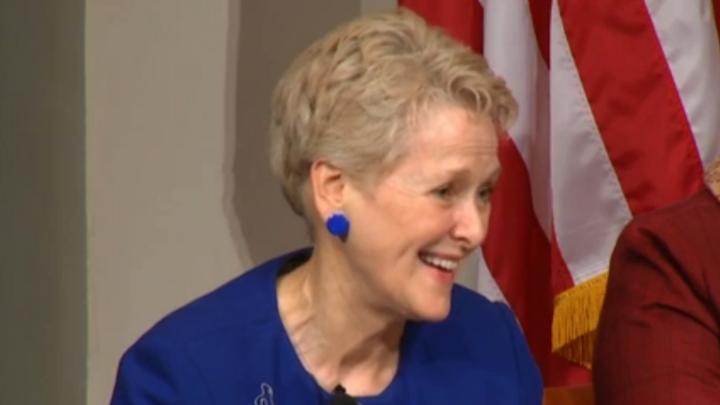When Vanessa Lievano Gutierrez moved to Colombia in the late 1980s, the situation was dire: armed conflict raged among left-wing guerilla groups and right-wing paramilitary forces, powerful drug cartels, and a weak government. One night, her mother was forced to throw herself on top of her children to protect them from shattering glass when debris from an explosive device burst through their window.
Eight years later, Gutierrez—an activist who spoke this week at Harvard Kennedy School during a forum that asked, “Can Women Stop War?”—was working in the Amazon rain forest with indigenous women leaders when she found herself observing a powerful moment that evoked memories of her childhood. It was then, she said, that she realized the potential power women can have when it comes to stopping conflict on a global scale.
“[The women] painted their faces and stood like black statues between the paramilitaries and their village,” she said to a packed auditorium. “Then they linked arms to build a wall to protect their husbands and their children. The paramilitary saw them and retreated in silence.”
After telling her story, Gutierrez introduced HKS lecturer and former U.S. ambassador to Austria Swanee Hunt, who moderated the fifteenth annual Institute for Inclusive Security Colloquium panel discussion. Discussants also included several important female world leaders: Mariam Jalabi of Syria; Ambassador Mathilde Mukantabana of Rwanda; Suraya Pakzad of Afghanistan; and Irene M. Santiago of the Philippines.
Hunt, who has worked in 40 conflict zones with thousands of women and policymakers, said peace processes are significantly less likely to fail when they are broadly inclusive. Women, in particular, have a tremendous advantage in negotiating peace, she said, often because they are seen as second-class citizens. “Women can work below the radar, because if they were men coming out and saying the same things, they would probably be shot on the spot,” she explained. "We can either talk about the women or we can be the women…you are the women that are doing it.”
Hunt then asked the panel participants to discuss their personal experiences with negotiating conflict and whether they have the sense that women actually do make “a very big” difference.
Pakzad spoke about her role as executive director of Voice of Women, a nongovernmental, nonprofit organization running a range of projects that support oppressed women and young girls in western Afghanistan. Recalling an instance in which she helped another woman seek refuge from her abusive husband, she told how the man threatened her by driving to her house at night and following her son to school. When Pakzad went to the chief of police, he was unable to provide her with security. Although she was afraid for her life, she said, she did not give in to the man’s threats. “I decided to be an activist, and I decided to be in this path, so there is no way to give up,” she declared. “You have to keep fighting and going on.”
Jalabi, who was born in Damascus and raised in the Golan Heights, discussed her hesitation in accepting a position as director for the National Coalition of Syrian Opposition and Revolutionary Forces in New York City as a representative for the United Nations. “I thought, is this a group that is going to be supportive of women, is this where I want to work?” she said. “And then I thought, ‘If I’m not going to work for them, if I’m not going to be pushing for the rights of women from within the coalition, if I’m not going to be an active participant from the inside, then it’s my fault. Every one of us needs to step up to that responsibility.”
Santiago—whose activism started when she founded a nonprofit organization in Davao City to work with women from poor communities—recalled a time when she was asked to support a male member of a panel that was negotiating peace with Islamic rebels in her country. She asked instead if she could be included on his team. She joined the group in February 2001 and was later a signatory to a ceasefire agreement. “The only way for people who are oppressed and marginalized to have a voice is to organize,” she said.
Mukantabana—Rwanda’s new envoy to the United States and the president of Friends of Rwanda Association (FORA), a nonprofit American relief association for orphaned children in Rwanda—said that the success of women has been influential in what her country has become: “I am part of that narrative of women who have risen through the ranks—64 percent of our Congress is composed of women.” “It’s not just women in the parliament or government,” she added. “It’s also women in the villages. Women have spearheaded peace.”









